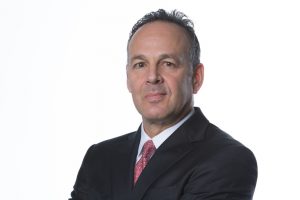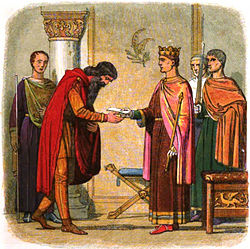A recent episode of RTE’s “The Week in Politics” once again left me frothing at the mouth. This time, though, it wasn’t the politicians. As a bit of light relief, RTE had invited a geneticist and a political scientist to discuss the results of their study into the connection between genetic inheritance and political allegiance. Worthy as that sounds, what they were actually looking at was the hoary old chestnut about Fine Gael being Anglo-Norman and Fianna Fáil Gaelic Irish. Unsurprisingly, they found that FG supporters were indeed marginally more likely to have Anglo-Norman roots.

But how did they discover this? They tested politicians’ surnames, of course. This is the point where I turned purple. Exactly what scientific test did they perform on the surnames to determine their level of Gaelickery or Anglo-Normanosity? Did they carefully take swabs from the insides of the surnames’ cheeks? Did they culture the surnames in their lab?
The truth is that Irish surnames are utterly unreliable as markers for cultural inheritance. Yes, ‘Fitzgerald’ sits at the other end of one particular spectrum from ‘O’Brien’. But what about a venerable Fianna Fáil Kerry surname like ‘McEllistrim’, “Son of Alastair [Fitzgerald]”? Or the apparently impeccably English ‘Higgins’, from a diminutive of the understandably widespread peasant name ‘Hick’. Which in Ireland can be an Anglicization of either Ó hUiggín, from Uiggín, Gaelic for ‘Viking’, or Ó hAodhagáin, grandson of big ould Hugh. Put that in your political science petri dish and smoke it.

Before they are anything else, surnames are words, embedded in language and mutating under the pressure of history like all other words. Maybe, once upon a time, they started out as badges of tribal identity but those badges have long been distorted beyond all reliability by the twists and turns of Irish history and individual Irish family histories. Reducing them to a quick political litmus test is just plain dim.

The real joy in the programme was seeing the scathing scepticism of the Fine Gael politician they asked for a response, none other than the delightfully-monikered Leo Varadkar. His people came over with Strongbow, you know.
The real lesson is that scientists are only marginally less likely to peddle bunkum in return for publicity than non-scientists. I read that in a recent survey.
Well said John. I forget who the writer was but he had one Irish great-grandparent and 7 English ones. He was horrified that he was often identified as Irish since it was his surname from his father’s father’s father that identified him as such. The American figure skater Nancy Kerrigan dismissed being called the Irish Katerina since she “wasn’t that Irish”. I always joked that maybe if she were more Irish she would have won the gold medal.
Well it could be worse. In the US we’ve had our share of great names running for office. Stan Still and Frank Schmuck are a couple that come to mind. Both must have come from a long line of family comedians…..
The new photo on your home page is beautiful. Where is it, please?
It’s Benwiskin in Co. Sligo – https://goo.gl/SmTxnp. The photo is by my good friend Jonathan Hession and comes from a book we did together a few years back, The Atlantic Coast of Ireland.
Thanks very much. Great job by both of you.
Actually it’s not Benwiskin. I misread my own caption. It’s Nephin mountain in Mayo.
It’s not often I get to correct my friend John Grenham, he was born with the brains, I had to console myself with mere good looks.
That is a photo of Nephin Mountain, which is in north County Mayo. Height 806 metres.
I’m very glad that you like the picture, thanks Virginia.
Thanks again to both of you–quite a spectacular photo.
Hi John,
Thank you for another insightful and witty article!
From my own experience I certainly agree with you that surnames in your family do not
determine your political persuasion or even religious persuasion.
My last name is Hepburn because of my father’s paternal line, while all my other family
names are Gaelic, Norse and Norman. All my Irish ancestors – going back hundreds of
years have been Catholic. My grandfather was a Fenian and I have a picture of James Connolly
on my wall. Yet some people have assumed that I’m a Protestant Loyalist because of my
one surname – Hepburn.
As a Canadian of Irish ancestry, I can’t help thinking of my American neighbours/cousins to the south. So much that is ridiculous about would-be Irish nomenclature is typically blamed on the Irish-Americans, but in this case: not an American in sight!
Really enjoyed reading your humorous remarks John. I can’t believe that surnames were even linked to one’s political or religious persuasion. In my view, the recent episode described rather reeks of pomposity.
Frothing at the mouth were we John?
Funny you were quite happy to ‘peddle bunkum’ yourself in your recent piece about the ‘wonderful Adoption Bill.’
My surname is Miller. Every one of my ancestors came from Ireland. Growing up in Western Pennsylvania, everyone assumed that my name was German. When you ask for info in a genealogy website, someone will cite an old reference which dooms you to be English or German. My great grandfather emigrated to the us around 1853. His hometown was Toormakeady in County Mayo. The local pubs will tell you that there’s a fellow in the parish named Miller who can give you the story. Toormakeady is the homeland for folks with the surname O’Melia, O’Malia, O’Malley, and Malloy. Is there the remotest possibility that my grandfather left home in 1845 and found work in England before coming to the US, and that he Anglicized his name to Miller.
A worthy froth: The history of names is rarely the same as the history of the person(s)/people(s) or place(s) that bear those names
Looking at an Irish surname, and trying to deduce anything very much, starts out by ignoring half of a person’s heritage, – the female half.
Aside from the absolute bunk of it – what about all the other waves of settlement contained in the surname record? The Huguenot, Welsh and English. There’s the odd German one care of the Palatines and general emigration.
The by positioning a dichotomy, even jokingly, they reinforce perceptions of Irishness being something approaching homogeneity when Irish heritage has been quite varied and is getting even more diverse.
Mr Peter Clarke: Yes, *this.* The female half. But also the quarters, and the eighths, and the sixteenths, and so on, both male and female. If you want to take your family tree beyond just your parents, you’re already looking at three grandparents who don’t share your surname. Great-grandparents, and that’s 7 out of 8 with other surnames.
There’s a branch of my family tree with the surname Charlebois. Totally French/French-Canadian surname, of course, and you might expect the descendants to bear forenames like Jean-Baptiste and Marie-Yvonne. Instead, we have names like Patrick and Michael and Mary Margaret Charlebois. Turns out a French-Canadian Charlebois married a first-generation Irish immigrant Moran, and their children married Irish emigrants or their descendants, and their grandchildren continued with the Irish theme in their marital choices. That Irish background is completely lost if we just focus on the French Charlebois (which is a totally cool surname, by the way: apparently it derives from Jolibois, or ‘joyful wood’).
Hi John, a certain Irish journalist who recently has gotten in a whole lot of hot water, wrote an article in 2011 in an Irish newspaper about the Trinity survey regarding Fine Gael politicians being more likely to be of Anglo-Norman decent, comparing it to a survey in England where people with Norman names are 10 percent richer that those with Anglo-Saxon names. He also had an article once pointing out that the Anglo-Irish were a lot more successful in various fields like science and engineering compared to their Catholic compatriots. These sort of articles got my goat up as someone who is a Catholic of mostly Gaelic origin (surnamewise), but he had a point. It’s down to simple factors; where are people with Anglo-Norman surnames most prevalent? I would say that they would in general be more likely to be found today not far from the Norman lordships areas in Leinster and Munster and the swathe that extends up through East Mayo. These then, as now are rich agricultural lands with prosperous market towns. I would go further in saying per where I come from in North Kilkenny that there are few Norman names in the hillier areas and more in the valley floors. Fine Gael was jokingly referred to as the party of the big farmers and Fianna Fail as that of the smaller farmers. Farms in the lowlands are generally larger and richer that mountain holdings. It makes sense that there might be a higher percentage of Hiberno-Normans in Fine Gael but it’s due to random luck, inheritance, better opportunities that these people ended up with a better start in life.
Yep. I have been researching my family for years. When I learned the name was originally spelled “Creane,”not Crane. Wow, that changed everything. That is the challenge when researching Irish names in the US. Most studies rely on the last name to identify a person as “Irish.” But, heck, there are so many Irish names that are not Gaelic.
Hilarious attempt–haven’t they something better to do? I carry a Welsh surname courtesy of a 5th great grandfather. Oh, I am abt 66% Irish both by DNA testing and the logic of my many generation family tree. I do not cotton with the British Imperial Crown much beloved by my father’s immigrant Scots Presbyterian grandparents who split up the marriage of their son from my “filthy Irish Catholic” grandmother, a 5th generation American of a Feinian family. My father met his own father one time in spite of living less than 30 miles apart most of their lives. Color me an Irish American member of Cairde Sinn Fein.